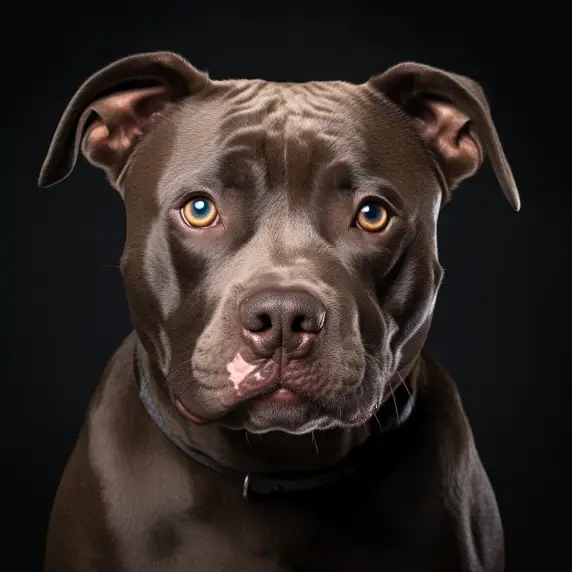Are Pit Bulls Hypoallergenic? 9 Tips to Reduce Dog Dander
When it comes to owning a pet, particularly a dog, one of the many questions potential dog owners might have is about allergies. Are pit bulls hypoallergenic?
This question might seem specific, but it’s an important one for those who suffer from pet allergies and are considering adopting or purchasing a pit bull. In this blog post, we will explore the nature of pit bulls, delve into the concerns around allergies, and seek to understand the relationship between pit bulls and allergens.
Whether you’re an existing pit bull owner curious about why you’re sneezing more often, or you’re considering adding a pit bull to your family, this comprehensive guide aims to shed light on all aspects of pit bull allergenicity.
Key Takeaways:
- Pit bulls are not considered hypoallergenic, as they shed dander and hair, common allergens for many people.
- Individual reactions can vary, so spending time with a pit bull may be necessary to gauge personal sensitivity.
- Hypoallergenic pitbull mix breeds may exist but are not entirely free from allergens.
- There are specific methods to reduce allergens if you own or are considering owning a pit bull.
Short Answer:
No, pit bulls are not classified as hypoallergenic dogs. They do shed, and their skin can produce dander, which is often the cause of allergies in sensitive individuals. However, this does not mean that everyone will react the same way, and there are strategies to minimize exposure to these allergens. If you love pit bulls and want to have one as a pet, don’t let the hypoallergenic question deter you. There are ways to manage and live happily with a pit bull, even if you have allergies.
What Does Hypoallergenic Mean?
Hypoallergenic is a term often used to describe substances, products, or even pets that are less likely to cause an allergic reaction. In the context of dogs, hypoallergenic breeds are those that are less likely to trigger allergies in people who are sensitive to pet allergens.
Understanding Allergens
- Dog Dander: This is composed of tiny, even microscopic, flecks of skin shed by dogs, cats, rodents, birds, and other animals with fur or feathers.
- Saliva: When a dog licks itself, the saliva gets on the fur. Once the saliva dries, it’s flaked off, along with other proteins that can cause allergies.
- Urine: Sometimes allergens are found in a dog’s urine and can cause allergies in a similar way to saliva.
While no dog breed is 100% hypoallergenic, some breeds are less likely to provoke allergic reactions. It’s worth noting that an individual’s reaction to a specific dog may vary widely, so labeling a breed as hypoallergenic does not guarantee that it will not cause allergies in all individuals.
Pit Bulls and Allergies
Pit bulls, like other breeds, produce dander, saliva, and urine that can contain allergens. Therefore, they are not considered hypoallergenic. However, the reaction can differ from person to person.
Understanding what hypoallergenic means helps explain why pit bulls are not classified this way and also sheds light on how potential allergen issues can be managed.
Pit Bull Characteristics: Shedding and Dander

Pit bulls are known for their distinct appearance, strength, and loyalty. However, when it comes to hypoallergenic qualities, understanding their shedding habits and dander production is essential. Here’s a detailed look at these factors:
Shedding Habits
- Moderate Shedding: Pit bulls are not heavy shedders but do shed year-round. They have a single, short coat that doesn’t hold onto as much dander as dogs with longer hair.
- Seasonal Influences: Like many other breeds, pit bulls may shed more during certain times of the year, particularly in the spring and fall.
Dander Production
- Dander Levels: Although pit bulls have short coats, they still produce dander, which is one of the primary causes of allergies in humans.
- Individual Variation: Not all pit bulls will produce the same amount of dander. Factors such as diet, health, and overall care can influence dander levels.
Are Blue Pit Bulls Hypoallergenic?
- No Difference: Blue pit bulls are not considered hypoallergenic, as they share the same characteristics as other pit bulls in terms of dander production and shedding.
Factors Influencing Allergies
- Grooming Habits: Regular grooming can reduce the amount of dander and, therefore, allergens.
- Home Environment: Keeping a clean home, especially in areas where the dog frequents, can help minimize allergens.
By understanding the shedding and dander characteristics of pit bulls, potential owners can make an informed decision and take the necessary steps to minimize allergens if they are prone to allergies.
Even though pit bulls are not classified as hypoallergenic, many owners with allergies find that they can live comfortably with this breed by taking appropriate precautions.
Common Allergens and Pit Bulls
Pit Bulls are wonderful pets, but they may not be suitable for everyone, especially those with allergies. Here’s an insight into the common allergens associated with Pit Bulls and how they can impact individuals:
1. Dander
- Definition: Dander consists of tiny flakes of skin and dried proteins from saliva, urine, and sweat.
- Impact on Allergies: It is one of the most common causes of allergies in people. Dander can float in the air and settle on surfaces, triggering allergic reactions.
2. Saliva
- Definition: Saliva contains specific proteins that some individuals may react to.
- Impact on Allergies: Direct contact or even indirect contact with dried saliva on the fur can lead to allergies.
3. Urine
- Definition: Like saliva, urine also contains proteins that may cause allergic reactions.
- Impact on Allergies: Allergies can be triggered through contact with areas where a pit bull may have urinated.
4. Why Am I Only Allergic to Pit Bulls?
- Individual Sensitivity: Some individuals might be allergic to particular breeds due to their body’s specific reaction to proteins found in that breed.
- Genetics and Environment: Genetics and environment play a role in why some individuals might react to one breed and not others.
5. Environmental Allergens
- Definition: These include pollen, dust, and mold that a dog might carry on its fur.
- Impact on Allergies: Pit bulls, like other dogs, can carry these allergens into the home on their fur, exacerbating allergies.
Understanding the nature of these allergens and their effect on allergies can help potential pit bull owners evaluate if this breed is the right fit for their family.
Precautions such as regular grooming, diet management, and maintaining a clean environment can mitigate some of these allergenic effects. However, consultation with a vet is always advisable for those with known sensitivities.
9 Tips to Reduce Dog Dander
For those who love Pit Bulls and other breeds but are concerned about dander-related allergies, there’s hope! By following these practical tips, you can significantly reduce the amount of dander in your living environment, making life with your beloved pet more comfortable:
1. Regular Grooming
- Bathe your dog once a week using hypoallergenic shampoos specifically designed to control dander.
- Brush your dog’s fur regularly to remove loose hairs and dander. Consider using specialized brushes that can capture more dander.
2. Invest in a Quality Air Purifier
Air purifiers with HEPA filters can effectively remove airborne dander, improving indoor air quality.
3. Use Allergen-Resistant Bedding and Covers
Cover your pet’s bedding and your furniture with allergen-resistant materials to prevent dander from settling.
4. Regular House Cleaning
- Vacuum regularly with a vacuum cleaner equipped with a HEPA filter.
- Dust surfaces using damp cloths or specialized dusters that trap dander rather than spreading it around.
- Wash your pet’s bedding frequently in hot water.
5. Designate Allergy-Free Zones
Keep certain rooms, like bedrooms, off-limits to pets to provide an area where allergic individuals can find relief.
6. Feed a Healthy Diet
Providing a balanced, high-quality diet helps promote healthy skin, reducing shedding and dander production.
7. Consult a Veterinarian for Specialized Treatments
In some cases, topical treatments or supplements may be prescribed to reduce dander production.
8. Wear Protective Clothing
If you’re highly sensitive, wearing gloves and long sleeves during grooming can minimize direct contact with dander.
9 Consider a Hypoallergenic Pit Bull Mix
Some mixed breeds may produce less dander. Consult with breeders or shelters that specialize in hypoallergenic dogs.
By implementing these strategies, you can enjoy the company of your Pit Bull or other dogs without the constant worry of dander-related allergic reactions. It might take some effort and adjustment, but the bond with your furry friend is well worth it!
Caring for a Pit Bull if You Have Allergies
Living with allergies doesn’t mean you have to avoid having a Pit Bull as a pet. With proper care and consideration, you can enjoy the loving companionship of this breed without unnecessary discomfort. Here’s how:
Understand Your Allergies
Determine the exact source of your allergies. Is it the dander, saliva, or something else? Knowing this will help you take specific actions to minimize your exposure.
Implement the Tips to Reduce Dog Dander
Follow the tips provided in the previous section to create an environment that reduces the allergens specific to dogs.
Seek Professional Medical Advice
Consult with an allergist who can provide you with treatments or medications that reduce allergic reactions. They can also perform allergy tests to understand the severity of your allergies to dog dander.
Build Tolerance Gradually
Spend time gradually acclimating to your Pit Bull. Start with short, controlled interactions and gradually increase the time and intimacy of contact as your tolerance builds.
Educate Family Members
Make sure everyone in the household knows about your allergies and what they can do to help, such as keeping the dog off certain furniture or assisting with grooming.
Consider a Professional Groomer
If grooming triggers your allergies, consider using professional grooming services to maintain your dog’s coat and reduce dander.
Create a Pet-Friendly Outdoor Space
If possible, create an inviting outdoor space where your Pit Bull can spend time, reducing the concentration of indoor allergens.
Adopt a Different Pit Bull Mix or Other Breeds
If traditional Pit Bulls trigger your allergies, look into adopting a hypoallergenic Pit Bull mix or other breeds known for being more suitable for those with allergies.
By being proactive and thoughtful in your approach, you can have a rewarding relationship with your Pit Bull, even if you have allergies. Balancing your health needs with the needs of your pet can lead to a happy and healthy life together.
Hypoallergenic Alternatives to Pit Bulls
While Pit Bulls may not be the ideal breed for those with severe allergies, there are alternative dog breeds that are recognized for their hypoallergenic properties. If you love Pit Bulls but find that they’re not compatible with your allergies, these breeds might be a good option for you:
Poodles
Available in standard, miniature, and toy sizes, Poodles are known for their curly hair that doesn’t shed much, reducing dander. They are intelligent and friendly, making them great family pets.
Portuguese Water Dogs
These dogs have a thick, wavy coat that doesn’t shed much. They’re known for their loving nature and energy, making them a fun companion.
Schnauzers
With three sizes available (miniature, standard, and giant), Schnauzers have a double coat that minimizes shedding. They’re loyal, intelligent, and good with families.
Bichon Frise
The Bichon Frise has a fluffy coat that’s low-shedding and retains less dander. These dogs are cheerful, playful, and great with kids.
Maltese
Maltese dogs have long, silky hair that doesn’t shed much. They are affectionate and get along well with both adults and children.
Shih Tzu
The coat of a Shih Tzu is similar to human hair and doesn’t shed a lot. They are known for their friendly and affectionate nature.
Yorkshire Terriers
Yorkies have a single layer of fine, silky hair, reducing the amount of dander. They’re small, intelligent, and full of personality.
Hypoallergenic Pitbull Mix
Certain Pit Bull mixes with hypoallergenic breeds can sometimes reduce the allergenic properties. It’s essential to consult with breeders or shelters that have knowledge about these specific mixes.
Remember, “hypoallergenic” doesn’t mean entirely allergen-free. Each dog is unique, and individual reactions may vary. Spend time with any potential pet to ensure compatibility with your allergies. Consult with breeders, shelters, and allergists to find a dog that will be a perfect match for your home and health needs.
Pit Bulls and Children with Allergies
Children with allergies might be more sensitive to certain allergens, including those related to dogs. The combination of a child’s allergy sensitivity and the Pit Bull’s shedding characteristics might raise concerns for some parents.
Here’s a closer look at how Pit Bulls may affect children with allergies and some strategies to manage this interaction:
Understanding Allergies in Children
Children’s immune systems may react to proteins found in a dog’s skin cells, urine, or saliva. Understanding the specific allergens that affect your child is crucial to managing their exposure.
Pit Bull’s Interaction with Children
Pit Bulls are known for their affectionate and gentle nature with children. However, their shedding and dander might trigger allergies in sensitive children.
Management Strategies
- Regular Grooming: Keeping your Pit Bull well-groomed can minimize dander and shedding. Regular baths and brushing can be very effective.
- Designating Allergen-Free Zones: Create spaces in the home where the dog is not allowed, such as the child’s bedroom. It can help in reducing allergen exposure.
- Air Purifiers: Investing in a quality air purifier with a HEPA filter can help eliminate airborne allergens, including pet dander.
- Teaching Proper Hygiene: Encourage children to wash their hands after playing with the dog and avoid touching their faces.
Consulting Healthcare Professionals
If you have concerns about your child’s allergies and the family dog, don’t hesitate to consult with healthcare professionals. An allergist can conduct tests to identify specific allergens and recommend appropriate actions.
Educating the Child
It’s essential to educate children about their allergies, so they understand the importance of following guidelines to minimize exposure.
Consider a Hypoallergenic Breed
If allergies persist and become a concern, it might be worth considering one of the hypoallergenic breeds as an alternative.
Monitoring and Adjusting
Regularly assess how your child is reacting to the family Pit Bull, and make necessary adjustments to routines, cleaning, or interaction guidelines.
Remember, having a child with allergies doesn’t necessarily mean you can’t have a Pit Bull in the family. With proper understanding, care, and management strategies, many families successfully create a loving and comfortable environment that includes both their allergic children and their beloved Pit Bulls.
Myths and Misunderstandings About Pit Bulls
Pit Bulls are often surrounded by various myths and misconceptions, some of which are related to their hypoallergenic status and others to their temperament and behavior. Let’s debunk some of these myths:
Pit Bulls are Hypoallergenic
A common myth is that certain breeds of Pit Bulls, like blue Pit Bulls, are hypoallergenic. In reality, no breed of Pit Bull is completely hypoallergenic. All dogs produce dander and other allergens to some degree.
Pit Bulls are Naturally Aggressive
Despite their sometimes intimidating appearance, Pit Bulls are not inherently aggressive. They are often loving and loyal family members. Proper training and socialization are key factors in a dog’s behavior.
Pit Bulls Have a Locking Jaw
This misconception has been thoroughly debunked. Pit Bulls’ jaw structure is no different from other dog breeds. They do not have the ability to “lock” their jaws.
Only Pit Bulls Cause Allergies
While some individuals may have reactions specifically to Pit Bulls, allergens can vary widely among different dog breeds. It’s the individual proteins and not the breed itself that typically causes allergic reactions.
All Pit Bulls are the Same
Just like any other breed, Pit Bulls can have unique personalities and characteristics. Some may shed more or less than others or have different temperaments.
Hypoallergenic Dogs Don’t Cause Allergies at All
While the term “hypoallergenic” may imply that a dog won’t cause any allergies, it’s important to understand that it simply means the dog is less likely to cause allergies. Even hypoallergenic dogs can cause reactions in highly sensitive individuals.
Pit Bulls are Untrainable and Stubborn
Pit Bulls can be highly trainable and intelligent. With proper training methods and consistency, they can learn and obey commands just like any other breed.
Pit Bulls are Not Suitable for Families
Contrary to this belief, Pit Bulls can make wonderful family pets. Their affectionate nature and loyalty make them great companions, even for families with children.
Understanding the truths behind these myths can lead to a more informed and compassionate view of Pit Bulls. It helps in making educated decisions, whether about adopting a Pit Bull or understanding how to manage allergies and the relationship with this breed.
Knowledge, rather than misconceptions, should guide decisions and attitudes towards these often misunderstood dogs.
Related:
FAQs: Are Pit Bulls Hypoallergenic?
Why am I allergic to pitbull hair?
Allergies to Pit Bull hair might be due to specific proteins found in their skin, saliva, or urine. Every dog, including Pit Bulls, sheds these allergens, and they can trigger allergic reactions in sensitive individuals.
How do you make a pitbull hypoallergenic?
While you can’t make a Pit Bull completely hypoallergenic, you can reduce allergens by bathing your dog regularly, using hypoallergenic shampoos, and maintaining a clean living environment. Regular grooming and air purifiers can also help minimize allergens.
What are allergic reactions in pit bulls?
Pit Bulls themselves can have allergies, which may present as itching, redness, respiratory issues, or digestive problems. These reactions could be due to food, environmental factors, or fleas. Veterinary consultation is advisable for proper diagnosis and treatment.
Do blue pits have allergies?
Blue Pit Bulls, like other Pit Bulls, can indeed have allergies. If you notice signs of allergies in your dog, such as excessive scratching or digestive issues, consult your veterinarian.
Are pit bulls OK for people with allergies?
It depends on the individual’s sensitivity to specific allergens. Some people with mild allergies may find living with a Pit Bull manageable with proper care and precaution. Others with more severe allergies might find it challenging.
Are blue pitbulls hypoallergenic?
No, blue Pit Bulls are not considered hypoallergenic. They can produce the same allergens as other Pit Bulls.
Why am I only allergic to pit bulls?
It might be that you are allergic to specific proteins that are more prevalent in Pit Bulls. However, allergies can be complex, and it’s advisable to consult with an allergy specialist to determine the exact cause of your reaction.
How can I find out if a pitbull is hypoallergenic?
As no Pit Bull is completely hypoallergenic, it’s beneficial to spend time with the dog before adoption and see how you react. Consulting with a veterinarian or allergist, and proper grooming and cleaning measures, may also help you manage potential allergies.
Final Thoughts
Pit Bulls, known for their loyalty and friendly nature, are a popular breed among dog lovers. However, the question of whether are Pit Bulls hypoallergenic often arises, especially for those who suffer from allergies.
As we have explored, Pit Bulls are not considered to be hypoallergenic. They shed dander and other allergens that can cause reactions in some individuals.
The key to managing allergies around Pit Bulls lies in understanding what triggers the allergies and implementing strategies to reduce exposure to these allergens.
From regular grooming to maintaining a clean home environment, there are actionable steps that can make living with a Pit Bull more comfortable for those with sensitivities.
For those severely allergic, considering an alternative hypoallergenic breed or seeking professional medical advice might be the best course of action.
It’s essential to recognize that while Pit Bulls may not be suitable for everyone, they can still be wonderful companions for many, provided that proper care and consideration are given to individual needs and health concerns.
In the end, understanding your personal situation and working closely with professionals such as veterinarians and allergists will help you make the best decision for you and your furry friend.
References
- A-Z Animals. “Are Pit Bulls Hypoallergenic?” A-Z Animals.
- Oodle Life. “Are Pitbulls Hypoallergenic? Complete Guide.” Oodle Life.
- Hypoallergenic Dog. “Are Pitbulls Hypoallergenic? An In-Depth Look.” Hypoallergenic Dog.






